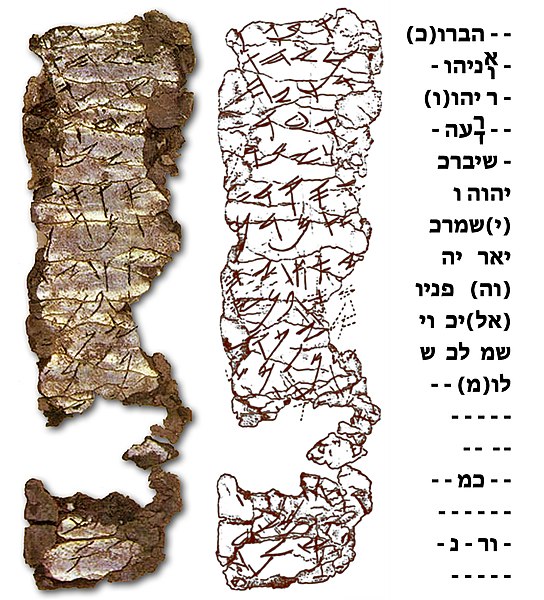(22) The Eternal spoke to Moses: (23) Speak to Aaron and his sons: Thus shall you bless the people of Israel. Say to them: (24) May the Eternal bless you and protect you! (25) May the Eternal cause God's face to shine upon you and show you favour! (26) May the Eternal raise God's face to you and set for you peace! (27) Thus they shall set My name upon the people of Israel, and I will bless them.

ושמו את שמי על בני ישראל. כאשר יזכירו את שמי עליהם אני אברכם לכולם, כהנים לוים ישראלים שהרי השם בכל פסוק ופסוק מהשלשה. ועוד על דרך המדרש, בשלשה פסוקים אלו יש בפסוק ראשון שלש תיבות, ובשני חמש, ובשלישי שבע, והסימן גה"ז, פסוק ראשון כנגד שלשה אבות שיזכור להם ברית אבות, פסוק שני כנגד חמשה חומשי תורה שהתורה נתנה בזכות אבות, פסוק שלישי כנגד שבעה רקיעים...
ושמו את שמי על בני ישראל, ...
A Midrashic approach: The first verse contains three words; the second verse contains five words The third verse contains seven words. The first verse represents the three patriarchs, i.e. God will remember for them the covenant with the patriarchs; the second verse represents the five Books of the Torah; as the Torah itself had been given to in recognition of the merits of the patriarchs. The seven words in the last verse are an allusion to the seven heavens...
(1) THE ETERNAL BLESS THEE. The Eternal increase your life and your wealth. (2) AND KEEP THEE. God will protect what God has increased so that no one steals it.
"And protect you." For every blessing requires protection so that it does not become an obstacle, God forbid. A master of Torah needs protection from pride, desecration of God's name and the like. And similarly, that they not forget their learning. A property owner needs protection that their wealth not be to their own detriment, like Korach and Navot the Jezreelite and the like. And similarly, protection from theft and loss. And likewise for everything that is in need of blessing, protection from whatever causes trouble is requested.
יאר, may God grant light to your eyes to see and appreciate all the wonderful things God has done and keeps on doing. You should become aware that all that you achieve is due to divine blessing.
...דבר אחר: "ישא ה' פניו" – יעביר כעסו ממך. "וישם לך שלום" בכניסתך שלום וביציאתך שלום עם כל אדם. רבי חנינא סגן הכהנים אומר: "וישם לך שלום" בביתך...
...Another interpretation: "The Eternal lift God's face" — (May God) remove divine anger from you. "and grant you peace": peace in your coming in, and peace in your going out, and peace with all humanity. Rabbi Chanina, the adjutant high-priest says: "and grant you peace" — in your house...
Studies in Bemidbar, Nehama Leibowitz, p. 67
There are in fact three separate blessings, which progress from the blessing of physical protection, through the blessing of spiritual shelter, to the blessing of shalom – wholeness, completion or peace.
Accordingly, the three sections of the priestly benedictions illustrate an ascending order, starting with a blessing concerned with man’s material needs and then dealing with his spiritual wants, and finally reaching a climax combining both these factors together, crowning them with the blessing of peace. This ascending order and increasing surge of blessing is reflected in the language and rhythm.
Elliot Dorff in My People's Prayerbook vol 7 p61
Because we are commanded to emulate God, our understanding of what God is being asked to do here has consequences for human behaviour...
1. [In general,] may Adonai give you all life's good and keep you from the bad. (Consequence: we should strive to bring people blessing, not trouble.)
2. [When your relationship with God is good,] may Adonai smile on you and give you more than you deserve. (Consequence: we should treat others graciously even beyond what they deserve.)
3. [When your relationship with God is bad,] may God face you [rather than turn his back on you] and make peace with you. (Consequence: when we quarrel with others, we should look them in the face and make peace.)



